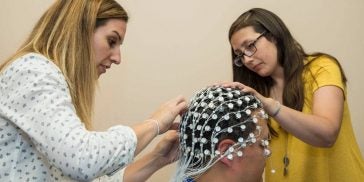Ph.D. in Health Sciences
Research
Major areas of faculty research include:
- Understanding risk factors for chronic disease across the life cycle, including the behavioral science of eating, environmental determinants of food choice (Nutrition track),
- Social-cultural factors that impact health across the lifespan (Human Development and Families Study track),
- Language processing, child and adult language disorders, development of social communication in children with neurodevelopmental disorders, translational research aimed at improving diagnostic and therapeutic services for clinical populations (Communicative Disorders track),
- Physical activity and health of older adults, behavior and culture, promoting physical activity, cardiovascular disease and rehabilitation, sports performance and supplementation, respiratory chronic diseases, and exercise physiology (Kinesiology track)
- Prevention and treatment of movement system disorders (Physical Therapy track)
Strengths of the program include an interdisciplinary approach to health, a student-centric approach to learning, high faculty to student ratio, and hands on experience conducting supervised research.
Research Highlights
Autism study partnering with Haskins Laboratories
Drs. Vanessa Harwood and Alisa Baron from Communicate Disorders are partnering with research scientists, Julia Irwin, Ph.D., and Nicole Landi, Ph.D., at Haskins Laboratories to better understand how children with autism spectrum disorder (ASD) learn language. We will employ EEG and eye-tracking technologies to study how children with autism (10-18-year-olds) integrate visual information with what they hear compared to their typically developing peers and how that affects their ability to learn language.
Learn more about these faculty and their projects.

Neurobiological markers of language and literacy in bilingual and monolingual children
Drs. Vanessa Harwood and Alisa Baron are conducting a study that will incorporate two child-friendly technologies, EEG and eye-tracking, to measure neurophysiological aspects of reading in both monolingual and bilingual 1st and 2nd-grade children. In addition to EEG and eye-tracking, children will participate in language and reading assessments, both in English and in Spanish, to gather data on their learning profiles. The goals of the project include defining particular aspects of the learning profile for bilingual readers as well as identifying effective interventions to support reading achievement in bilingual and monolingual low SES populations.
Learn more about these faculty and their projects.
Clinical, behavioral and cellular mediators of 5-year progression of muscle dysfunction in COPD.
Dr. Alessandra Adami, an Assistant Professor of Kinesiology, received a five-year National Institute of Health grant to determine longitudinal changes in skeletal muscle function and physical activity in a large cohort of older smokers with and without chronic obstructive pulmonary disease (COPD), i.e. fourth-leading cause of death in USA. This National Heart Lung and Blood institute-funded project will allow her to identify clinical, behavioral and molecular mechanisms associated with muscle function decrease in COPD patients. Research team includes investigators from University of Rhode Island, Brown University, and The Lundquist Institute at Harbor-UCLA, CA.
Acute effects of active-assisted cycling in healthy older adults and in persons with Parkinson’s Disease.
Dr. Ward-Ritacco is currently working with an interdisciplinary team of researchers from the College of Health Sciences in collaboration with industry partner, Theracycle, manufacturers of an active-assisted/motorized stationary cycle. Faculty from Kineisology (M. Delmonico, D. Riebe, C. Ward-Ritacco), Physical Therapy (C. Clarkin), and Communicative Disorders (A. Baron, V. Harwood) are conducting exploratory research comparing the acute effects of active-assisted cycling to traditional recumbent cycling in healthy older adults and in persons with Parkinson’s Disease. These studies will allow us to examine the metabolic work and perception of effort associated with standardized exercise session and examine the acute changes in pre- to post-session measures of energy and fatigue, gait and cognitive function. Dr. Ward-Ritacco recently received funding from the RI Foundation to support this work.
The Effects of Alcohol and Parental Communication on Young Women Transitioning to Young Adulthood.
Dr. Hans Saint-Eloi Cadely (Human Development and Family Studies) is partnering with Dr. Kathy Hutchinson (College of Nursing) to examine the influence of alcohol use and parental communication before college on alcohol use and reports of intimate partner violence (i.e., victimization via psychological, physical, and sexual violence) among young adult women (18-29 years old). We will be targeting both residential and non-residential freshmen college women who are entering college during the fall of 2020 and young adult women who are not attending college.
Prevention and Treatment of Movement System Disorders
Dr. Ellen McGough conducts innovative research that aims to improve physical function and prevent mobility disability in adults with neurodegenerative disease and age-related impairments. She incorporates assessment tools and treatment interventions, including:
- Portable technology to assess markers of mobility disability in real-world settings
- Fall risk assessment batteries that incorporate wearable inertial sensors
- Data visualization to inform clinical decision-making and patient/care partner education
- Virtual and in-person exercise programs
- Train-the-trainer models to improve physical activity and function.
Christine Clarkin, PT, DPT, PhD conducts research focused on understanding the neurobiological substrates associated with neural plasticity in individuals with neurological injury and neurodegenerative disease and developing effective physical therapy behavioral interventions based on those principles. She incorporates assessment tools and measures that are translatable to the clinical setting. Recent projects include:
- LSVT BIG treatment intervention in People with Parkinson Disease
- Validation of Wearable technology in People with Parkinson Disease compared with Healthy Controls
- Forced versus Voluntary Exercise Paradigms
- Brain Derived Neurotrophic factors as neurobiological markers in neuroplasticity
- Executive Function and its assessment and impact on motor function in agingn and individuals with neurodegenerative disease
Mariusz Furmanek, PhD, PT, DPT – Dr. Furmanek’s research strives to understand the human neural control of movement, improve state-of-the-art technology and translate scientific findings into clinical applications such as physical rehabilitation, athletic training, and virtual engagement. More specifically, Dr. Furmanek’s research focuses on:
- Integration of multisensory information (vision, proprioception)
- Motor coordination in reach-to-grasp action
- Motor variability in both healthy and clinical populations
- Technology in rehabilitation, virtual reality (VR), robotics
- Evidence-based practice in rehabilitation and sport.
- Validity and reliability of functional measures in human performance.
